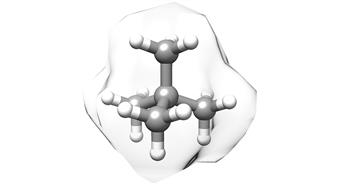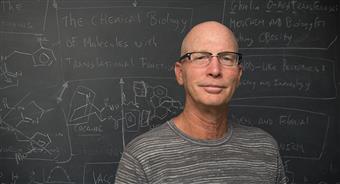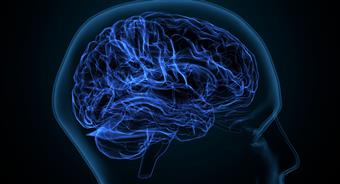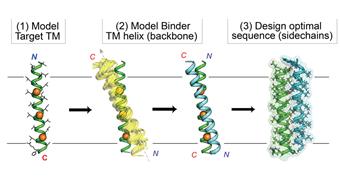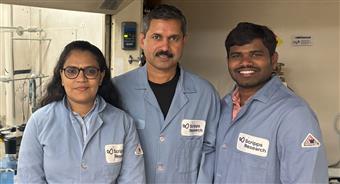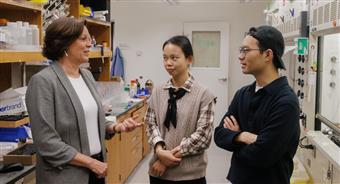
Scripps Research discovery points to possible driver of Parkinson's disease Study shows how blocking cellular housekeeping system leads to buildup and spread of abnormal protein aggregates in the brain.
February 22, 2022
LA JOLLA, CA Parkinson's disease may be driven in part by cell stress-related biochemical events that disrupt a key cellular cleanup system, leading to the spread of harmful protein aggregates in the brain, according to a new study from scientists at Scripps Research.
The discovery, published in The Journal of Neuroscience in February 2022, offers a clear and testable hypothesis about the progression of Parkinson's disease, and may lead to treatments capable of significantly slowing or even stopping it.
We think our findings about this apparent disease-driving process are important for developing compounds that can specifically inhibit the process of disease spread in the brain, says study senior author Stuart Lipton, MD, PhD, Step Family Endowed Chair, founding co-director of the Neurodegeneration New Medicines Center, and professor in the Department of Molecular Medicine at Scripps Research.
Parkinson's disease affects roughly one million people in the United States. Its precise trigger is unknown, but it entails the deaths of neurons in a characteristic sequence through key brain regions. The killing of one small set of dopamine-producing neurons in the midbrain leads to the classic Parkinsonian tremor and other movement impairments. Harm to other brain regions results in various other disease signs including dementia in late stages of Parkinson's. A closely related syndrome in which dementia occurs early in the disease course is called Lewy Body Dementia (LBD), and affects about 1.4 million people in the U.S.
In both diseases, affected neurons contain abnormal protein aggregations, known as Lewy bodies, whose predominant ingredient is a protein called alpha-synuclein. Prior studies have shown that alpha-synuclein aggregates can spread from neuron to neuron in Parkinson's and LBD, apparently transmitting the disease process through the brain. But precisely how alpha-synuclein aggregates build up and spread in this way has been unclear.
One clue, uncovered by Lipton's lab and others in prior research, is that the Parkinson's/LBD disease process generates highly reactive nitrogen-containing molecules including nitric oxide. In principle, these reactive nitrogen molecules could disrupt important cellular systems, including housekeeping systems that normally keep protein aggregates under control.
In the new study, the Scripps Research team demonstrated the validity of this idea by showing that a type of nitrogen-molecule reaction called S-nitrosylation can affect an important cellular protein called p62, triggering the buildup and spread of alpha-synuclein aggregates.
The p62 protein normally assists in autophagy, a waste-management system that helps cells get rid of potentially harmful protein aggregates. The researchers found evidence that in cell and animal models of Parkinson's, p62 is S-nitrosylated at abnormally high levels in affected neurons. This alteration of p62 inhibits autophagy, causing a buildup of alpha-synuclein aggregates. The buildup of aggregates, in turn, leads to the secretion of the aggregates by affected neurons, and some of these aggregates are taken up by nearby neurons.
The process we observed seems very similar to what is seen in Parkinson's and LBD brains, says study first author Chang-Ki Oh, PhD, a staff scientist in the Lipton laboratory.
The researchers also tested postmortem brains of LBD patients, and again found that levels of S-nitrosylated p62 were abnormally high in affected brain areas supporting the idea that this process occurs in humans.
Lipton and Oh say that S-nitrosylation of proteins becomes more likely in many situations of cellular stress, including the presence of protein aggregates. Thus, this chemical modification of p62 could be a key factor in a self-reinforcing process that not only stresses brain cells beyond their limits, but also spreads the source of stress to other brain cells.
The team is now working to develop drug-like compounds that specifically inhibit the S-nitrosylation of p62. Although it would take years to develop such compounds as potential commercial drugs, they could, in principle, slow the Parkinson's/LBD disease process or prevent its further spread in the brain after it begins, Lipton says.
S-Nitrosylation of p62 Inhibits Autophagic Flux to Promote -Synuclein Secretion and Spread in Parkinson's Disease and Lewy Body Dementia was co-authored by Chang-Ki Oh, Nima Dolatabadi, Tomohiro Nakamura, and Stuart Lipton, of Scripps Research; Piotr Cieplak, Maria Diaz-Meco and Jorge Moscat of Sanford Burnham Prebys Medical Discovery Institute; and John Nolan of the Scintillon Institute in San Diego.
The study was supported in part by the National Institutes of Health (R01 NS086890, R35 AG071734, DP1 DA041722, R01 DA048882, RF1 AG057409, R01 AG056259, R01 AG061845, R61 NS122098, RF1 NS123298), the Brain & Behavior Research Foundation, and the Michael J. Fox Foundation.
Neurological Disorders Molecular Medicine Lipton, Stuart
More from Scripps
20/04/2024
New copper-catalyzed C-H activation strategy from Scripps Research Two-mode reactions inspired by human detox enzymes offer powerful new tools for drug discover...
12/04/2024
Scripps Research chemists devise easier new method for making a common type of building block for drugs Scientists transform simple linear amines into saturated...
06/04/2024
A simple, inexpensive way to make carbon atoms bind together A Scripps Research team uncovers a cost-effective method for producing quaternary carbon molecules,...
04/04/2024
Developing a vaccine for the zombie drug xylazine Scripps Research chemical biologists design an early proof-of-concept vaccine that could lead to the first...
30/03/2024
How blocking a neural receptor responsible for addiction could reduce alcohol use A Scripps Research team found that a new therapeutic that targets the kappa op...
13/03/2024
New computational strategy boosts the ability of drug designers to target proteins inside the membrane Customized-design approach could streamline the design of...
29/02/2024
Scripps Research scientists reveal how first cells could have formed on Earth New phospholipid discovery brings researchers closer to understanding how primordi...
29/02/2024
How molecular handedness emerged in early biology Scripps Research chemists fill a major gap in origin-of-life theories.
February 28, 2024
LA JOLLA, CA Mole...
22/02/2024
Snaking toward a universal antivenom Scripps Research scientists discovered antibodies that protect against a host of lethal snake venoms.
February 21, 2024
...
06/02/2024
Calibr-Skaggs announces expansion of option and license agreement with AbbVie to develop novel cell therapies for solid tumors and autoimmune diseases
AbbVie...
26/01/2024
Re-energizing mitochondria to treat Alzheimer's disease Scripps Research team restored neuron-to-neuron connections in human cells.
January 25, 2024
LA JO...
24/01/2024
100 years of Science Changing Life: Scripps Research celebrates a century of transforming human health For the last century, institute leaders and renowned scie...
23/01/2024
New technology lets researchers track brain cells' off switches The method could shed light on what goes awry in numerous brain conditions when neurons ar...
09/01/2024
Three decades of giving: Announcing the Calibr-Skaggs Institute for Innovative Medicines The ALSAM Foundation, founded by the Skaggs family, provides lasting g...
04/01/2024
Life science entrepreneur Gene Lay joins Scripps Research Board of Directors Lay, founder of the global biotech company BioLegend, brings invaluable experience ...
21/12/2023
Taming a plant-derived toxin Scripps Research team modifies the traditional poison picrotoxinin for potential neurological drugs and anti-parasite treatments. ...
19/12/2023
Scripps Research Executive Vice President Eric Topol gives TED talk on transformative power of AI in medicine Topol provides an overview of how AI models can i...
13/12/2023
New AI-powered algorithm could better assess people's risk of common heart condition Early detection of atrial fibrillation can reduce the risk of stroke an...
07/12/2023
Nanoparticle flu vaccine design shows promise in early tests Scripps Research-designed vaccine could provide broad, enduring protection against influenza A str...
16/11/2023
Numerous Scripps Research scientists named Highly Cited Researchers Clarivate's annual, global list represents researchers who have demonstrated significant...
07/11/2023
Multiple sclerosis drug invented at Scripps Research slows long-term devastating disease progression Late-breaking data reinforces the effectiveness and safety ...
05/10/2023
Keren Lasker named a 2023 Moore Inventor Fellow The prestigious award will support Lasker's inventive research in membraneless organelles and their applica...
22/09/2023
Michael Bollong named a 2023 Amgen Young Investigator The prestigious award will support Bollong's research identifying new molecular targets and therapeuti...
09/09/2023
Philip Dawson receives 2024 American Chemical Society National Award Dawson is honored with the Arthur C. Cope Late Careers Scholar Award for his foundational c...
07/09/2023
Scripps Research chemists devise a method for C-H activation of alcohols The method represents a new toolkit for making drugs and other compounds.
September 06...
31/08/2023
Scripps Research receives $1.5M to surveil infectious disease threats in wastewater Bill & Melinda Gates Foundation award to support the development of multi-pa...
16/08/2023
How cold temperatures trigger the brain to boost appetite Scripps Research scientists' discovery could lead to new weight loss and metabolic health treatmen...
08/08/2023
Human antibody that targets carfentanil, fentanyl and related opioids reverses overdose effects in preclinical study Scripps Research-developed antibody therapy...
04/08/2023
How sensory neurons impact the gut Scripps Research scientists show that the receptor PIEZO2 in sensory neurons controls gut motility and transit time, which a...
26/07/2023
AbbVie and Calibr Expand Strategic Collaboration to Advance Several Preclinical and Early-stage Clinical Assets The expanded strategic collaboration will advan...
23/07/2023
Scripps Research scientists develop AI-based tracking and early-warning system for viral pandemics Machine-learning system effectively predicts emergence of pro...
19/07/2023
Monitoring T cells may allow prevention of type 1 diabetes Scripps Research study shows that analyzing T cells in blood samples could be used to select at-risk ...
19/07/2023
Scripps Research mourns passing of leading organic chemist Albert Eschenmoser Eschenmoser pioneered key reactions in synthetic chemistry and shaped the understa...
15/06/2023
Scripps Research awarded $46.8 million by NIH to promote human health through innovative translational science and training The Translational Institute is harne...
13/06/2023
Scripps Research's Danielle Grotjahn named 2023 Pew Scholar in the Biomedical Sciences The award will support Grotjahn's study of how cells assemble the...
31/05/2023
Crossing the ring: new method enables C-H activation across saturated carbocycles Scripps Research chemists add another powerful tool to their molecular editin...
24/05/2023
Scripps Research develops behind-the-scenes tool for better biomedical data discovery The new resource makes datasets more discoverable for life science communi...
19/05/2023
Scripps Research neuroscientist Hollis Cline elected to American Academy of Arts and Sciences Cline is recognized for her discoveries about the role of sensory ...
19/05/2023
Scripps Research's Skaggs Graduate School awards doctoral degrees to 31st graduating class Commencement ceremony will be livestreamed via Zoom and on instit...
13/05/2023
A better route to benzocyclobutenes, sought-after building blocks for drugs Scripps Research chemists devise a new, C-H activation-based method for the synthesi...
09/05/2023
Renowned Scripps Research professor Jeffery Kelly elected to National Academy of Sciences Kelly's groundbreaking work on protein misfolding has led to thera...
28/04/2023
Mirror-image molecules pave new path for cancer drug discovery By comparing how mirror image versions of small molecules impact clusters of proteins, Scripps R...
22/04/2023
How alcohol consumption contributes to chronic pain A Scripps Research team showed how both alcohol intake and alcohol withdrawal can lead to increased pain and...
21/04/2023
Xin Jin receives dual awards to study autism risk genes in neurodevelopment Major grants from the National Institutes of Health and California Institute for Reg...
20/04/2023
Trim the sugar: New HIV vaccine design improves immune response Scripps Research vaccine candidate headed for clinical trials.
April 19, 2023
LA JOLLA, CA A...
18/04/2023
Therapeutic can seek and destroy potent opioid to treat overdoses Scripps Research chemists developed a new biologic to work against the synthetic opioid carfen...
07/03/2023
How heavy alcohol consumption increases brain inflammation The findings by a Scripps Research team point toward a potential new drug target for treating alcohol...
02/03/2023
Scientists find human antibodies that can block multiple coronaviruses including SARS-CoV-2 Results from a Scripps Research and UNC team pave the way for a vacc...
28/02/2023
$10 million grant funds Scripps Research Alcohol Research Center through its 50th year The five-year grant supports research into the neurobiology of alcohol us...
28/02/2023
Immune system drug shows promise in treating alcohol use disorder, a Scripps Research clinical trial reports Scientists at Scripps Research found that apremilas...
 Scripps Research discovery points to possible driver of Parkinson's disease Study shows how blocking cellular housekeeping system leads to buildup and spread of abnormal protein aggregates in the brain.
Scripps Research discovery points to possible driver of Parkinson's disease Study shows how blocking cellular housekeeping system leads to buildup and spread of abnormal protein aggregates in the brain.















